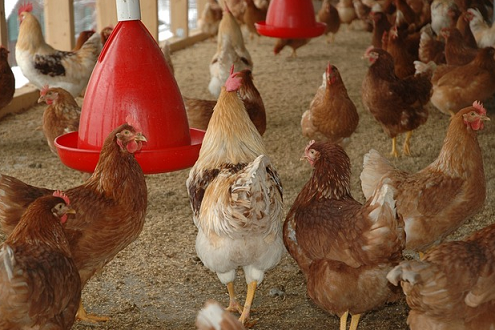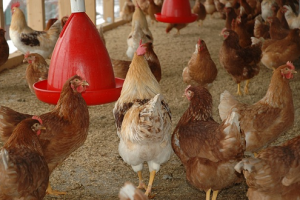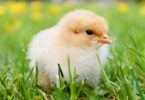Can chickens get fleas? Whether you have just gotten your chickens or you are planning on doing that soon, you might have thought about the possibility of a flea infection. The answer to that question is sadly yes, they can. Poultry animals tend to have this problem, just as much as other furry animals, even if all they possess are feathers! Just keep on reading in order to get to know everything regarding this problem. How it occurs, how to treat your pets accordingly and necessary prevention measures.
Can Chickens Get Fleas and How does This Affect Them?
As it was already established, chickens can get fleas. Just as your dog or cat can bring home fleas, chickens have their own set of parasites. The season in which the contamination is most likely to occur is summer. Fleas may present a range of detrimental effects on your poultry, determining irritation and a general state of restlessness. And worse than that, is affects your chickens negatively as in causing malnutrition, anemia and an inevitable decrease in egg production.
Common External Parasites in Chickens
There are three main types of fleas that can affect your poultry, according to the area you live in:
- The European chicken flea is quite common in the United States. They remain on the birds for a limited period of time in order to feed themselves. If not, you may also find them in the litter. Keep in mind that if your flock gets contaminated, these fleas may cause disturbance to other pets you might own.
- The Western chicken flea. These fleas are found mostly in the litter among droppings. They may remain just occasionally on the chickens.
- The Sticktight flea is mostly met in warm climates. These fleas are dark colored and are similar to dog fleas. They attach themselves to the head of the chicken. They affect your chickens significantly, causing them restlessness, agitation and even blindness. Additionally, when it comes to young chicks, the Sticktight flea might even cause them death. The female flea will lay eggs in sand litter which can lead to a flea contamination in your flock.
Treatment Options
There is a wide range of effective treatments available you may use in order to help your chickens to get rid of fleas. Make sure to inform yourself properly before applying the actual treatment, especially if you consume your chickens’ eggs and meat, as certain medications present side effects that you ought to get acquainted with. We will indicate a number of preliminary steps you ought to consider if you are dealing with this problem
- If your flock is contaminated, clean the coop thoroughly by removing their previous bedding and scrub the location using apple cider vinegar before setting new bedding. ACV disinfects the location thoroughly and decontaminates it from parasites.
- You should also consider scattering food grade diatomaceous earth powder in the coop as it functions effectively in disinfecting the place properly, causing the death of the fleas. In addition to that, you may also take into account using these powders on your chickens from time to time, for the same disinfection reason.
- As mentioned above, apple cider vinegar is a great natural disinfector. It is really effective when treating this issue. Therefore, you can also use it on your chickens by sprinkling it on their feathers. Nonetheless, make sure it doesn’t reach their eyes and mouths.
- Another way in which you can help your affected poultry is by using aloe vera lotion, chamomile, or dry fowl shampoo. By doing this, their skin will be soothed and will stimulate recovery from the flea bites and the disturbing itchiness they caused.
- Bear in mind that you ought to avoid using dog or other animals’ flea products; they may present fatal consequences to your chickens.
Prevention Measures
If your chickens are flea-free at the moment, don’t assume that there’s no risk of flea contamination! So, get the necessary prevention measures in order to hinder that from happening. Here are a couple of tips on how to provide your chickens with proper care:
- You should clean the chicken coop regularly and thoroughly. Pay a special attention to remaining feathers, as they may hide the hatching eggs.
- Try restricting regular visits from other poultry owners, as they can carry these parasites on their footwear, clothes, etc.
- Arrange a secure, isolated location to feed your chickens in, in order to prevent other wild birds from coming and thus causing the contamination of your flock.
- When buying new birds, keep them separately from the rest of the flock for 14 days in order to watch them attentively for any parasites they may carry.
- Accommodate your poultry with appropriate dust bath areas. A dust bath equals a shower in chicken terms. It provides appropriate care for their feathers and skin and, additionally, it is a way of preventing parasites from appearing.
References:
http://www.the-chicken-chick.com/2012/08/poultry-lice-and-mites-identification.html
http://entomologytoday.org/2015/04/13/backyard-chickens-may-have-mites-lice-and-fleas/
http://www.communitychickens.com/got-fleas-13-chicken-flea-facts/
http://www.tillysnest.com/2013/07/backyard-chickens-and-fleas.html
http://www.fleabites.net/chicken-fleas-ceratophyllus-gallinae-bites/




WOW, I’m shocked!! My Dog got some flea bites recently and I have no idea it could infect my chickens too. Damn!!
I have been doing lots of reading about fleas on http://www.fleabitessite.com/, but they never mentioned that it can affect Chickens too.
Thanks for opening my Eye